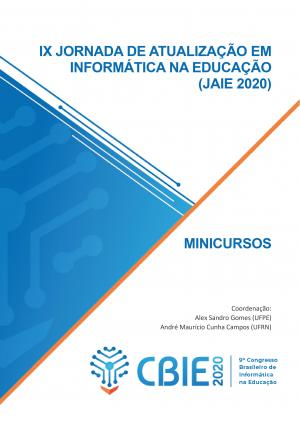IX Jornada de Atualização em Informática na Educação
Palavras-chave:
Educação em ComputaçãoSinopse
As Jornadas de Atualização em Informática na Educação (JAIE) são momentos e conteúdos de atualização científica e tecnológica para a comunidade de Informática na Educação (IE) do Brasil. Elas são organizadas anualmente na programação do Congresso Brasileiro de Informática na Educação (CBIE) sob a forma de um conjunto de minicursos. Cada jornada enfoca temas atuais e relevantes da área de IE. Eles visam estimular a formação de pesquisadores das áreas de Computação, Educação, Psicologia, Design e afins com abordagens teóricas e metodológicas contemporâneas e de vanguarda. Integram essa edição da JAIE, cinco capítulos que sintetizem o estado da arte ou da técnica e ajudem a evoluir a área: “Avanços da Aprendizagem Colaborativa com Suporte Computacional na Educação 4.0”, “Computação criativa com Scratch, Mixly e Arduino: Prototipando com HackEduca Conecta”, “Desenvolvendo Jogos Educacionais Digitais Inovadores e Instigantes com o Framework PlayEduc”, “Desmistificando a adoção de Learning Analytics: um guia conciso sobre ferramentas e instrumentos” e “Análise de Discussões em Fóruns Educacionais Usando Mineração de Texto e Análise de Grafos”.
Capítulos
-
1. Avanços da Aprendizagem Colaborativa com Suporte Computacional na Educação 4.0
-
2. Computação criativa com Scratch, Mixly e Arduino: Prototipando com HackEduca Conecta
-
3. Desenvolvendo Jogos Educacionais Digitais Inovadores e Instigantes com o Framework PlayEduc
-
4. Desmistificando a adoção de Learning Analytics: um guia conciso sobre ferramentas e instrumentos
-
5. Análise de Discussões em Fóruns Educacionais Usando Mineração de Texto e Análise de Grafos
Downloads



